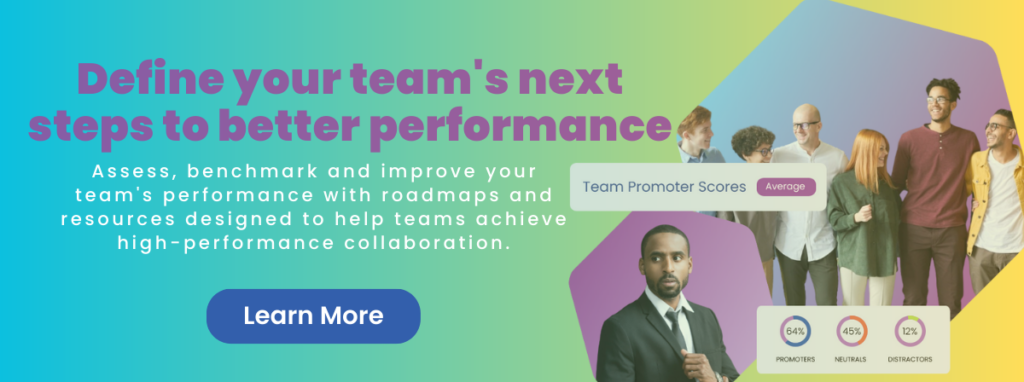Workplace teams are somewhat like a family. And any time a group of people with wildly different personalities coexist together – whether it’s at the Thanksgiving table or the conference table – things don’t always go smoothly. While some teams are blessed with personality types that balance each other well, many have a dominating personality (or two) who throw the dynamic off-kilter.
Having team members who speak up often is not inherently a bad thing. But when one person dominates conversations and meetings in a workplace, it often stifles engagement from other colleagues. It can make the office feel unsafe to contribute, offer constructive criticism, and bring diverse opinions, which ultimately harms morale. Sometimes this happens because the dominating person simply lacks self-awareness, or they’re just very extroverted and excited to participate. Other times, it’s because the person has an “Enforcer” conflict style. This is an attitude that what’s most important is that they “win” and get their own needs met, even if it damages the relationship.
It takes courage to confront this problem, but it’s vital if you want to restore harmony within your team. Whether you’re a manager of a domineering employee, a colleague wanting to rein in a teammate’s behavior, or a professional trying to curb your own tendency to take over, here’s how to effectively tackle this common issue.
Work on Your Own Self-Awareness
Chiming in during meetings might come naturally to talkative, extroverted people. But employees with dominating personalities may not realize that their frequent contributions can cause quieter colleagues to hold back. If you’re quick to speak up in meetings, it’s helpful to work on self-awareness to ensure you’re not keeping others from engaging. If you have a lot to say, ask yourself, “Am I pausing to see if anyone else wants to chime in?” and “Do I recognize when I’ve been speaking more than a few minutes?”
Need help understanding your team and leading it to the best it can be? RallyBright can help. Learn how by booking a demo here.
Tools like the DISC personality assessment – a measure of behavioral style based on the qualities of dominance, influence, steadiness and conscientiousness – are among those that workplaces rely on to help employees deepen that valuable self-understanding. Take some time to check out DISC and other widely available assessments to discover more about your own priorities and preferences.
How DISC Can Help
What exactly is a DISC personality assessment, and how can it help when it comes to raising self awareness about a dominant personality? The DISC personality assessment identifies four main variants of personality: dominance, influence, steadiness, and conscientiousness. A majority of people have a “Steady” personality, while the least amount are typically “Dominant.”
DISC personality assessments can be an excellent tool for raising self awareness, because these tests give participants scores in each area. These scores can reveal someone’s strengths, weaknesses, values, and even how to best approach their own personality type. DISC personality assessments can work as a mirror, allowing someone to understand their own personality type better, so they know how their own actions might be landing. Leaders can also use DISC personality assessments to better understand team members, and why they’re exhibiting certain behaviors.
Encourage others to talk
To create a more inclusive and collaborative environment during meetings, it’s important to encourage all team members to participate and share their perspectives. If you notice that one person is monopolizing the conversation, you can take steps to ensure that everyone has a chance to contribute.This also takes pressure off colleagues who have a peacemaker personality type and want to make sure everyone is heard.
Set Aside Time in the Agenda
Sometimes employees might be tempted to share, but they might not find the “perfect moment,” or their window of opportunity might pass before they jump on it. To avoid this, leaders can set designated time in the agenda for feedback, open discussions, and “popcorn talk.” Instead of simply continuing on to the next agenda item, set aside time for reflection and relaxed discourse.
Foster Psychological Safety
Psychological safety in the workplace is great for many things, but it can be especially helpful for boosting employee engagement (workplaces with high levels of psychological safety report 76% more engagement). Psychological safety, or the belief that someone won’t be punished or made fun of for speaking up, can help employees share ideas, thoughts, questions, and concerns.
Start by Breaking the Ice
Almost everyone knows what it’s like when a meeting starts off a little stiff. Instead of simply letting everyone sit there awkwardly, start meetings off with team-building exercises or “icebreakers.” Data tells us that teams that are more engaged generate more revenue, and that team-building activities can boost work ethic and motivation.
Don’t Forget Remote Employees
In the era of working remotely and Zoom calls, productive teams need to focus on engaging not only in-person employees. Research reveals that remote employees are susceptible to feeling less engaged, and might benefit from some special attention as far as engagement goes. Instead of letting remote employees sit there silently when it comes to understanding how to manage a dominating personality, ensure there are good opportunities and forums for remote employees to engage.
Create Boundaries
Establishing boundaries is key when managing a dominant personality on your team. If someone is frequently interrupting others, it’s important to communicate that this behavior is not acceptable. One way to do this is by politely interjecting and reminding them that other team members also need a chance to share their thoughts. Regardless of the approach, boundaries need to be set, so the person with the dominating personality doesn’t discourage others from sharing and participating.
Tips for Setting Boundaries
Setting boundaries around communications in a professional setting can often be challenging, but they can be extremely beneficial in the long run. First, in order to create boundaries, you can discuss conversational habits with the dominating person both during public meetings and outside of them. For example, you can gently remind them in real-time that someone else was speaking or that the floor is not yet open, and you can also discuss their habits with them individually after the meeting ends.
Next, you can create a practice around sharing, which prevents interruption. This can include setting designated times for feedback and discussion and giving each person time to speak. Setting ground rules for sharing and communicating can help ensure a level playing field.
Lastly, you can address the group to raise general awareness. You can hold discussions with the group about communication expectations, where improvements can be made, and what communication challenges they might be experiencing.
Politely Redirect Dominant Personalities
When working with individuals who have dominant personalities, it’s important to find ways to redirect their behavior in a respectful and constructive manner. If you notice the topic start to veer off course, try to gently guide the discussion back on track or shift the focus to include others in the conversation.
“Dovetailing Off of That”
One technique is to use something they’ve said as a jumping off point and to spin it positively. For example, you can cut in and say, “Matt, I like what you said about [fill in the blank]. What does everyone else think?” This gentle redirection acknowledges what the dominating person is saying, while giving others room to participate.
“That’s Excellent – Can We Hold That Thought?”
When an employee starts to go off topic, they probably have many different ideas they’re bringing to the table. You can choose one thought, praise it, and ask to address the thought further as a group. You can say, “Wait one second, I want us to dive into this idea further. What does everyone else think about this?”
Confront Colleagues Privately
If previous attempts to redirect their behavior have not been successful, it may be necessary to speak with the dominant employee privately and escalate the issue to their manager, if appropriate. If that’s you, communicate that it’s not that you don’t want to hear from them. Rather, you just want to make sure you and your colleagues hear from others. Explain that you want to create a space where everyone feels welcome to participate. Lay out how this is hard to do when one person always jumps in first. If they tend to interrupt, politely point out that you love their enthusiasm, but they need to let colleagues finish talking before chiming in.
Don’t Allow Interruptions
Effective teamwork requires open and respectful communication. If someone in the group interrupts or dominates the conversation, it can hinder progress and make team members feel unheard. To ensure everyone has a chance to speak and be heard, encourage respectful communication, and establish ground rules for discussions. For example, remind the group to listen actively and avoid interrupting others. If someone does interrupt, gently redirect the conversation back to the speaker by saying, “Let’s hear what [name] has to say first.” By fostering a culture of respect and collaboration, your team can work together more effectively and achieve better results.
Other Options for Managing Team Dynamics With a Dominating Personality
If these strategies don’t work and someone’s behavior is truly harmful, it may be wise to ask HR to intervene. If not, or if that’s not effective, it could be time to consider if this is the right work environment for you. When coworkers are repeatedly inconsiderate, there’s nothing wrong with finding a more harmonious workplace.
There’s no question that confronting the issue of a dominant employee can feel uncomfortable. But it’s crucial to restore harmony on your team. It’s a common issue that many of the companies we work with at RallyBright face. Addressing it benefits your work culture and creates a safer environment for others to contribute.
Keep in mind that most dominating employees likely have good intentions. Tackling this issue head-on will not only benefit their teammates but will also help employees strengthen their listening and team-building skills, and in doing so, meet with greater professional success themselves.
With that in mind, here are some options that leaders have when managing a dominating personality on their team.
Address Them Individually
One of the best ways to manage a dominating employee is to communicate with them individually, on a transparent level. You can praise their initiative (“You always bring a lot of ideas to the table”) while still sharing that they’re communication style may not give others enough space to participate. You can also communicate that you’d like them to continue sharing but do so in a way that allows others to participate.
Help Them Feel Heard
It’s very likely that your dominating employee finds value in being “heard,” and they feel like their ideas are often overlooked. When they’re dominating a conversation, you should acknowledge their contributions and ideas, and you can further discuss their thoughts with them on an individual level.
Work on General Team Building
If one employee is dominating interactions and other employees are having trouble finding space to communicate, it’s possible that your team could benefit from general team-building activities. This can help them bond with one another, improve their own communication, and find value in one another’s contributions.
Conduct Assessments to Determine Next-Steps
In order to improve team communication and cultivate a high team performance, you can conduct team-centered assessments. These can give you valuable insights into team strengths and potential areas for improvement, to drive meaningful change and develop high performing teams. Here at RallyBright, we offer our flagship team-centered assessment, which gives you consistent and validated measurements in order to help you benchmark and optimize your team’s performance.
Managing Diverse Personalities for Stronger Team Performance
Different personalities on a team can be powerful because they can fuel innovation, contribute to interesting discourse, and lead to valuable contributions. But when a personality is too challenging, it can negatively impact the way the team functions. By learning how to manage a dominating personality, leaders can better understand their employees, cultivate an environment of effective communication, and ultimately maximize the performance of their entire team.
If you’re looking to optimize your team’s performance, enable stronger team performance, and boost positive team dynamics, then we should talk. Here at RallyBright, we help you get the best out of your team, and our customers experience more leadership engagement, more revenue growth, and better results when it comes to team performance dimensions. Request a demo today to find out how RallyBright can help improve team dynamics and enable stronger team performance.



